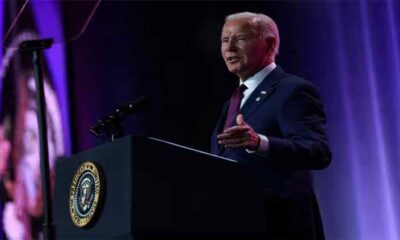On Dec 19, 1958, President Dwight Eisenhower made a Christmas address that would change the course of history.
While the content of his speech wasn’t exactly the Gettysburg Address, it has endured as a moment in history for the last 65 years because of how it was delivered — in space.
In fact, Eisenhower’s holiday message was the first time in human history that we here on Earth heard a voice broadcast through space.
“This is the President of the United States speaking. Through the marvels of scientific advance, my voice is coming to you via a satellite circling in outer space. My message is a simple one: Through this unique means I convey to you and all mankind, America’s wish for peace on Earth and goodwill toward men everywhere.”
The satellite that carried the message was cobbled together from commercial communications equipment by the Army Signal Corps. Called the Signal Communication by Orbiting RElay, or SCORE, it launched on Dec. 18, 1958.
It was a secretive affair: fewer than 100 people knew about the project and, of those, only 35 knew in advance about the president’s message.
Eisenhower’s tape had actually been a last-minute addition: Other tapes with pre-recorded messages had already been sealed in the rocket’s capsule, so the engineers had to overwrite the tapes with radio waves to make room for Eisenhower’s clipped tones.
When SCORE launched just a week before Christmas 1958, it was a milestone for space travel: SCORE made it into orbit and broadcast Eisenhower’s message via shortwave radio, but it was also the first successful launch of the Atlas rocket system — a family of missiles that were once delivery vehicles for nukes and were now tasked with the brand-new business of putting satellites in space.
But still, that this was the first time a voice was heard from space is what makes this launch truly historic. People around the world could use their radios to hear the signal, albeit with plenty of hiss. Both radio and TV stations broadcast the message, too, for audiences of millions.
SCORE was a revolution in tech built on war: Just a year prior to SCORE’s launch, the USSR launched Sputnik 1, the first satellite to orbit Earth. Sputnik 1 carried meteorological sensors to measure data from Earth’s upper atmosphere and relay it back to scientists in the USSR. It spurred the United States to start work on its own satellites that could talk to ground control.
Its tech was primitive compared to today’s satellites. But SCORE proved that audio communication via space was possible, said James David, a curator at the Smithsonian’s National Air and Space Museum.
“The important thing is that it was the first communication satellite and it was part of an overall program of the United States to get a variety of satellites in space,” he said.
And unlike today’s satellites, most (if not all) of which are powered by solar panels, SCORE relied entirely on battery power. Over the course of 35 days, it ran for just eight hours total time before losing juice.
By January 21, 1959, SCORE’s orbit had decayed to the point that it plunged back into the atmosphere and burned up, leaving nothing behind but a powerful legacy.
Sixty-five years later, SCORE has paved the way for satellites to be used in everything from phone calls and texting to television broadcasts and global Internet coverage — and it all started with a reminder to be kind.
Post Views: 61


 Fashion3 months ago
Fashion3 months ago
 World3 months ago
World3 months ago
 World3 months ago
World3 months ago
 Sports2 months ago
Sports2 months ago
 Sports2 months ago
Sports2 months ago
 World3 months ago
World3 months ago
 Tech3 months ago
Tech3 months ago
 Business2 months ago
Business2 months ago



















